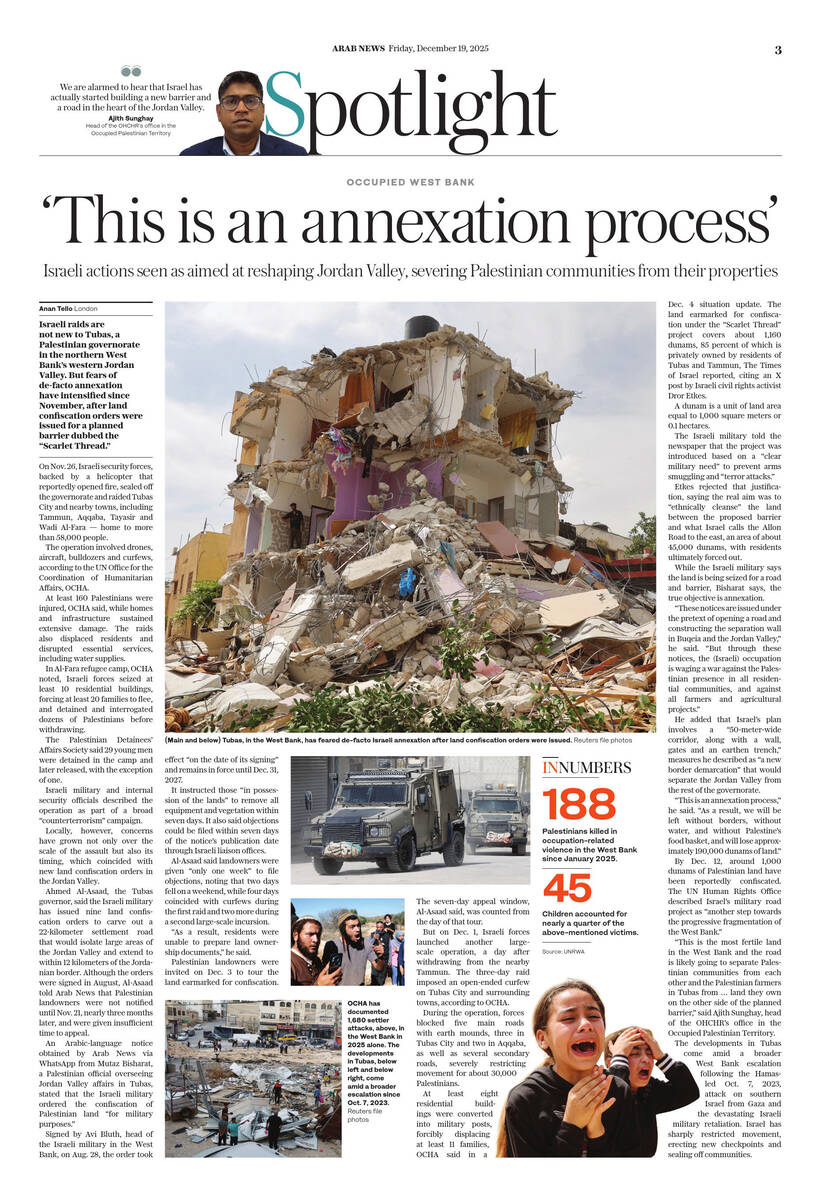MOSUL: Iraqi authorities have removed the remains of 139 people from a large pit believed to contain victims of Daesh, an official said on Sunday.
The Alo Antar hole — a natural desert feature turned into a mass grave by Daesh extremists — is located in Tal Afar, some 70 kilometers (40 miles) west of Mosul in northern Iraq.
It is not known how many bodies were dumped in the pit, but search efforts for other victims are ongoing.
“We have removed the remains of 139 persons and also human body parts,” said Dia Karim, director of the mass graves department at the Foundation of Martyrs — a government institution tasked with finding mass graves and identifying remains.
“They include women and men,” Karim said, adding that “according to testimonies, the victims date back to Daesh rule” or before when Al-Qaeda was present in the area.
Testimonies also suggest, according to Karim, that “the victims are Yazidis, Shiite Turkmen and security forces personnel from Mosul,” the de facto capital of Daesh’s self-declared “caliphate.”
At its peak, the group ruled over swathes of Syria and Iraq, while its fighters committed beheadings, torture and enslavement, turning life into a living hell and leaving behind many mass graves.
In northern Iraq, they committed some of their worst atrocities against the Yazidis — an ethnic and religious minority — including mass executions and sexual slavery.
Ahmed Assadi from the Foundation of Martyrs said the victims “were not buried but dumped in the hole,” whose full depth ranges between 42 and 12 meters.
“Some of the victims had been shot and others were found with their throats cut,” and several bodies were found in body bags.
Assadi added that some of the clothing found on them indicated that they might have been Yazidis or Turkmen, adding that other bodies were found in orange jumpsuits of the kind typically worn by Daesh hostages.
The bodies recovered from Alo Antar were taken to forensic departments to be identified using DNA testing.
The mass grave was discovered after Iraqi forces retook control of the area in 2017, but the work to recover the bodies only started in May of this year.
Iraqi authorities frequently announce the discovery of mass graves of Daesh victims, as well as those containing Daesh extremists themselves and others dating to the rule of dictator Saddam Hussein, but the identification process is slow, costly and complicated.
The United Nations estimates the extremists left behind more than 200 mass graves which might contain as many as 12,000 bodies.
A similar but much larger sinkhole known as Al-Khasfa in northern Iraq is also thought to contain the bodies of many Daesh victims.
In northern Syria, a 50-meter-deep gorge has been used as a dumping site for dead bodies during and after Daesh rule, according to a 2020 Human Rights Watch report.
Iraq recovers remains of 139 likely Daesh victims from mass grave
https://arab.news/p3xkj
Iraq recovers remains of 139 likely Daesh victims from mass grave

- The Alo Antar hole — a natural desert feature turned into a mass grave by Daesh extremists — is located in Tal Afar
How Israeli land grabs are redrawing the map of Palestine’s Jordan Valley

- A major incursion in Tubas caused damage and displacement, but residents say a planned 22-km barrier poses bigger threat
- Israel calls the “Scarlet Thread” wall a security measure; activists say it’s a land grab severing the Jordan Valley
LONDON: Israeli raids are not new to Tubas, a Palestinian governorate in the northern West Bank’s western Jordan Valley. But fears of de-facto annexation have intensified since November, after land confiscation orders were issued for a planned barrier dubbed the “Scarlet Thread.”
On Nov. 26, Israeli security forces, backed by a helicopter that reportedly opened fire, sealed off the governorate and raided Tubas City and nearby towns, including Tammun, Aqqaba, Tayasir and Wadi Al-Fara — home to more than 58,000 people.
The operation involved drones, aircraft, bulldozers and curfews, according to the UN Office for the Coordination of Humanitarian Affairs, OCHA.
At least 160 Palestinians were injured, OCHA said, while homes and infrastructure sustained extensive damage. The raids also displaced residents and disrupted essential services, including water supplies.

In Al-Fara refugee camp, OCHA noted, Israeli forces seized at least 10 residential buildings, forcing at least 20 families to flee, and detained and interrogated dozens of Palestinians before withdrawing.
The Palestinian Detainees’ Affairs Society said 29 young men were detained in the camp and later released, with the exception of one.
Israeli military and internal security officials described the operation as part of a broad “counterterrorism” campaign.
Locally, however, concerns have grown not only over the scale of the assault but also its timing, which coincided with new land confiscation orders in the Jordan Valley.
Ahmed Al-Asaad, the Tubas governor, said the Israeli military has issued nine land confiscation orders to carve out a 22-kilometer settlement road that would isolate large areas of the Jordan Valley and extend to within 12 kilometers of the Jordanian border.
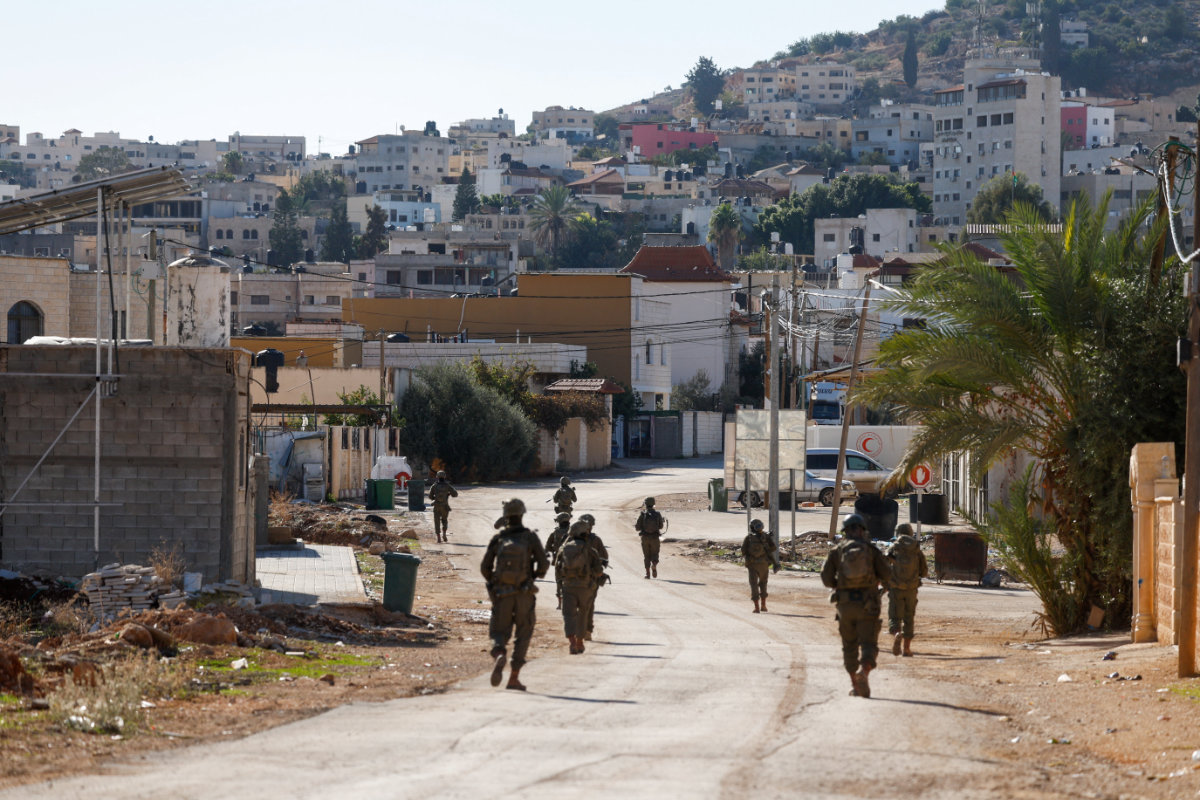
Although the orders were signed in August, Al-Asaad told Arab News that Palestinian landowners were not notified until Nov. 21, nearly three months later, and were given insufficient time to appeal.
An Arabic-language notice obtained by Arab News via WhatsApp from Mutaz Bisharat, a Palestinian official overseeing Jordan Valley affairs in Tubas, stated that the Israeli military ordered the confiscation of Palestinian land “for military purposes.”
Signed by Avi Bluth, head of the Israeli military in the West Bank, on Aug. 28, the order took effect “on the date of its signing” and remains in force until Dec. 31, 2027.
It instructed those “in possession of the lands” to remove all equipment and vegetation within seven days. It also said objections could be filed within seven days of the notice’s publication date through Israeli liaison offices.
Al-Asaad said landowners were given “only one week” to file objections, noting that two days fell on a weekend, while four days coincided with curfews during the first raid and two more during a second large-scale incursion.
“As a result, residents were unable to prepare land ownership documents,” he said.
Opinion
This section contains relevant reference points, placed in (Opinion field)
Palestinian landowners were invited on Dec. 3 to tour the land earmarked for confiscation. The seven-day appeal window, Al-Asaad said, was counted from the day of that tour.
But on Dec. 1, Israeli forces launched another large-scale operation, a day after withdrawing from the nearby Tammun. The three-day raid imposed an open-ended curfew on Tubas City and surrounding towns, according to OCHA.
During the operation, forces blocked five main roads with earth mounds, three in Tubas City and two in Aqqaba, as well as several secondary roads, severely restricting movement for about 30,000 Palestinians.
At least eight residential buildings were converted into military posts, forcibly displacing at least 11 families, OCHA said in a Dec. 4 situation update.
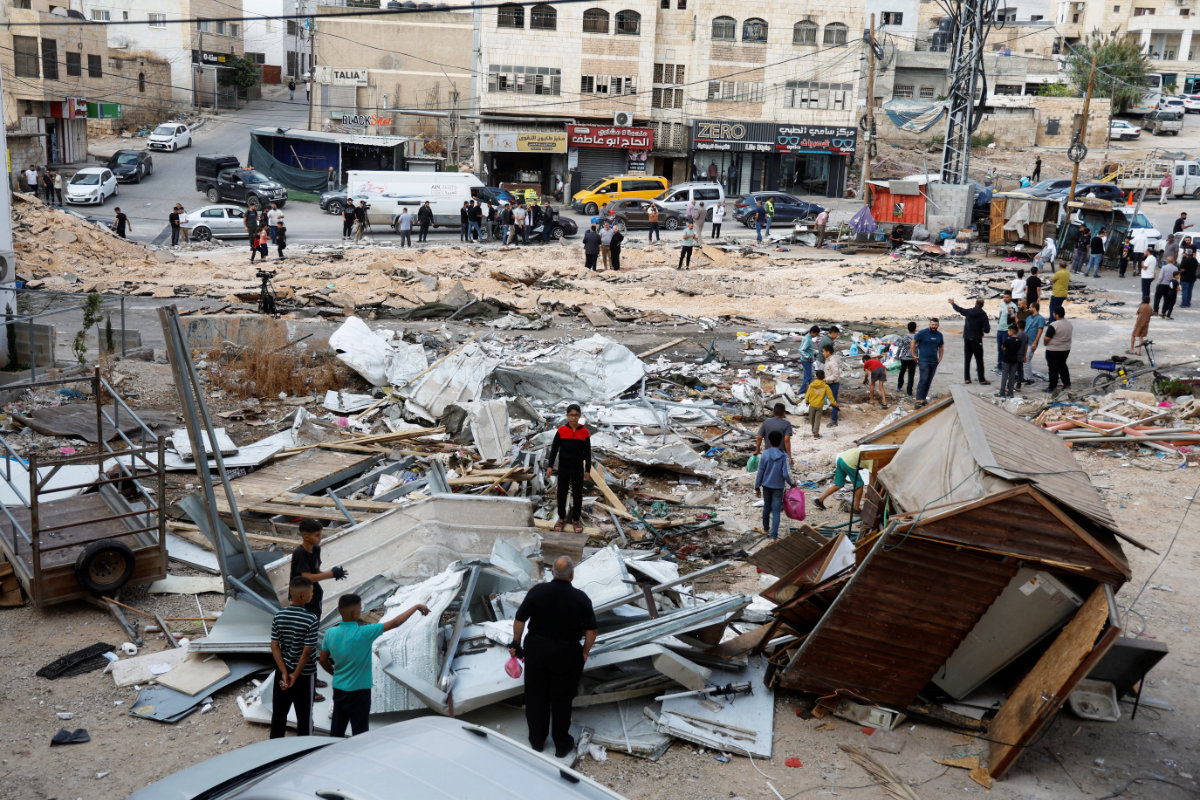
The land earmarked for confiscation under the “Scarlet Thread” project covers about 1,160 dunams, 85 percent of which is privately owned by residents of Tubas and Tammun, The Times of Israel reported, citing an X post by Israeli civil rights activist Dror Etkes.
Dunam is a unit of land area equal to 1,000 square meters or 0.1 hectares.
The Israeli military told the newspaper that the project was introduced based on a “clear military need” to prevent arms smuggling and “terror attacks.”
Etkes rejected that justification, saying the real aim was to “ethnically cleanse” the land between the proposed barrier and what Israel calls the Allon Road to the east, an area of about 45,000 dunams, with residents ultimately forced out.
On Dec. 1, the Israeli newspaper Haaretz reported that the army was preparing to build a new separation wall deep inside the occupied West Bank, in the heart of the Jordan Valley. The wall would stretch 22 kilometers and span 50 meters in width, cutting Palestinians off from tens of thousands of dunams of land.
According to the report, the project would require demolishing homes, agricultural buildings, wells, water lines and trees along the route.
It would also encircle the herding community of Khirbet Yarza, isolating about 70 residents who depend on several thousand sheep for their livelihood, and separate agricultural and pastoral communities from their lands, similar to what the separation barrier in the western West Bank has done.

Palestinians say the plan, if implemented, amounts to annexation of the northern West Bank.
“New notices have been issued, pursuant to the military orders, for the seizure of citizens’ lands in the areas of Tubas and Tammun, for the purpose of removing homes and agricultural projects, including greenhouses, sheds, and sheep pens,” Bisharat told Arab News.
He said authorities also ordered the removal of a 5-kilometer water pipeline.
“This decision will effectively end the Palestinian presence and agriculture on more than 22,000 dunams of cultivated land and lead to the displacement of more than 60 families,” he added.
While the Israeli military says the land is being seized for a road and barrier, Bisharat argues the true objective is annexation.
“These notices are issued under the pretext of opening a road and constructing the separation wall in Buqeia and the Jordan Valley,” he said. “But through these notices, the (Israeli) occupation is waging a war against the Palestinian presence in all residential communities, and against all farmers and agricultural projects.”

He added that Israel’s plan involves a “50-meter-wide corridor, along with a wall, gates and an earthen trench,” measures he described as “a new border demarcation” that would separate the Jordan Valley from the rest of the governorate.
“This is an annexation process,” he said. “As a result, we will be left without borders, without water, and without Palestine’s food basket, and will lose approximately 190,000 dunams of land.”
Al-Asaad echoed those warnings, saying Israel’s plans amount to de-facto annexation.
“The new settlement plan, under which the occupation forces intend to establish an apartheid separation wall, will separate the Jordan Valley from Tubas governorate and confiscate areas estimated at hundreds of thousands of dunams,” he said. “This constitutes a plan to annex the Jordan Valley.”
He warned the project would inflict severe political, economic and agricultural losses, undermine prospects for a Palestinian state and isolate Tubas from its eastern border with Jordan under 12 km of Israeli control.
By Dec. 12, around 1,000 dunams of Palestinian land have been reportedly confiscated. The UN Human Rights Office described Israel’s military road project as “another step towards the progressive fragmentation of the West Bank.”
“This is the most fertile land in the West Bank and the road is likely going to separate Palestinian communities from each other and the Palestinian farmers in Tubas from … land they own on the other side of the planned barrier,” said Ajith Sunghay, head of the OHCHR’s office in the Occupied Palestinian Territory.
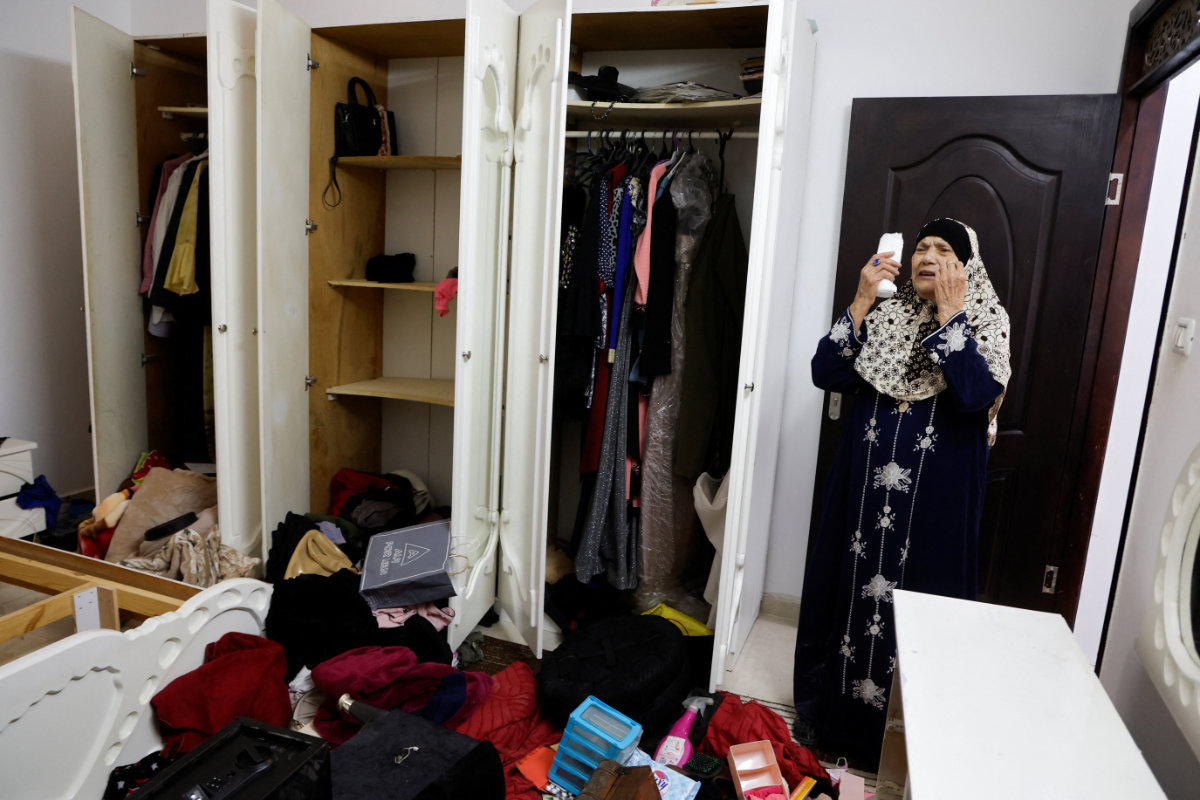
Immediately after the seizure orders were issued, Al-Asaad said, local authorities submitted an initial objection through the Northern Jordan Valley file and the Colonization and Wall Resistance Commission, collected powers of attorney and land deeds, and coordinated with land departments to document ownership.
“We continue to work on submitting objections through attorney Tawfiq Jabarin,” he added, reiterating that curfews and military operations severely limited their ability to complete the legal file.
Etkes, however, dismissed the objection process as meaningless, saying Israel’s judiciary would reject the appeals.
Still, Tubas residents say they will continue to resist. Al-Asaad said officials plan to internationalize the issue, urging the Palestinian Foreign Ministry to organize tours for diplomats and raise the case in international forums.
“We will mobilize local and international media to expose the danger of a plan that would seize half the governorate’s land and destroy the two-state solution,” he said.
IN NUMBERS:
• 188 Palestinians killed in occupation-related violence in the West Bank since January 2025.
• 45 Children accounted for nearly a quarter of the above-mentioned victims.
(Source: UNRWA)
Jabarin, a Palestinian lawyer and human rights activist representing landowners, submitted an initial objection in late November, according to the Al-Quds Al-Arabi newspaper.
He argued that Jordan already shares a secure border with the Jordan Valley and that an internal wall would not prevent arms smuggling.
He said Palestinian communities are the ones who need protection from repeated settler attacks.
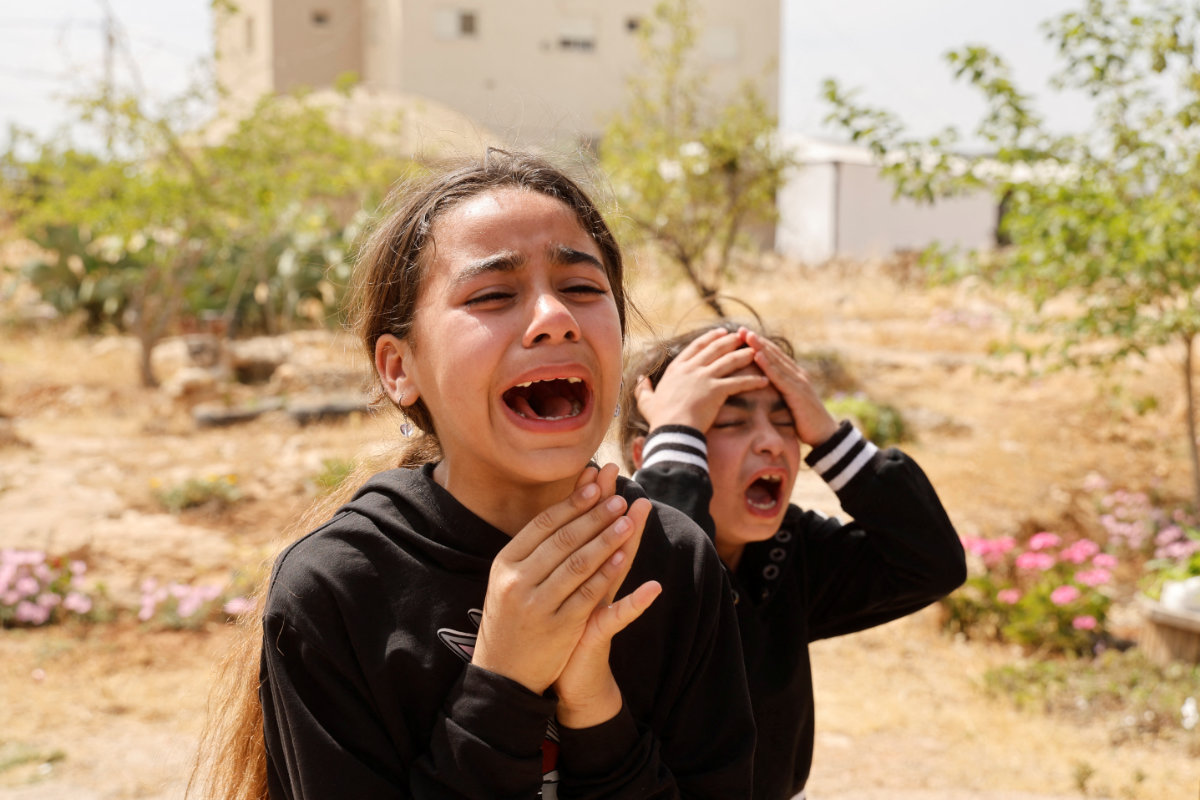
The developments in Tubas come amid a broader West Bank escalation following the Hamas-led Oct. 7, 2023, attack on southern Israel from Gaza and the devastating Israeli military retaliation.
Israel has sharply restricted movement, erecting new checkpoints and sealing off communities.
Since January, Israeli forces have intensified operations, killing dozens and displacing tens of thousands. The campaign began in Jenin refugee camp on Jan. 21, dubbed “Operation Iron Wall,” and expanded to Tulkarem and Nur Shams, displacing at least 32,000 people in January and February alone, according to UN figures.
Human Rights Watch said on Nov. 20 that Israel’s forced expulsions in West Bank refugee camps amount to war crimes and crimes against humanity — allegations Israel denies.
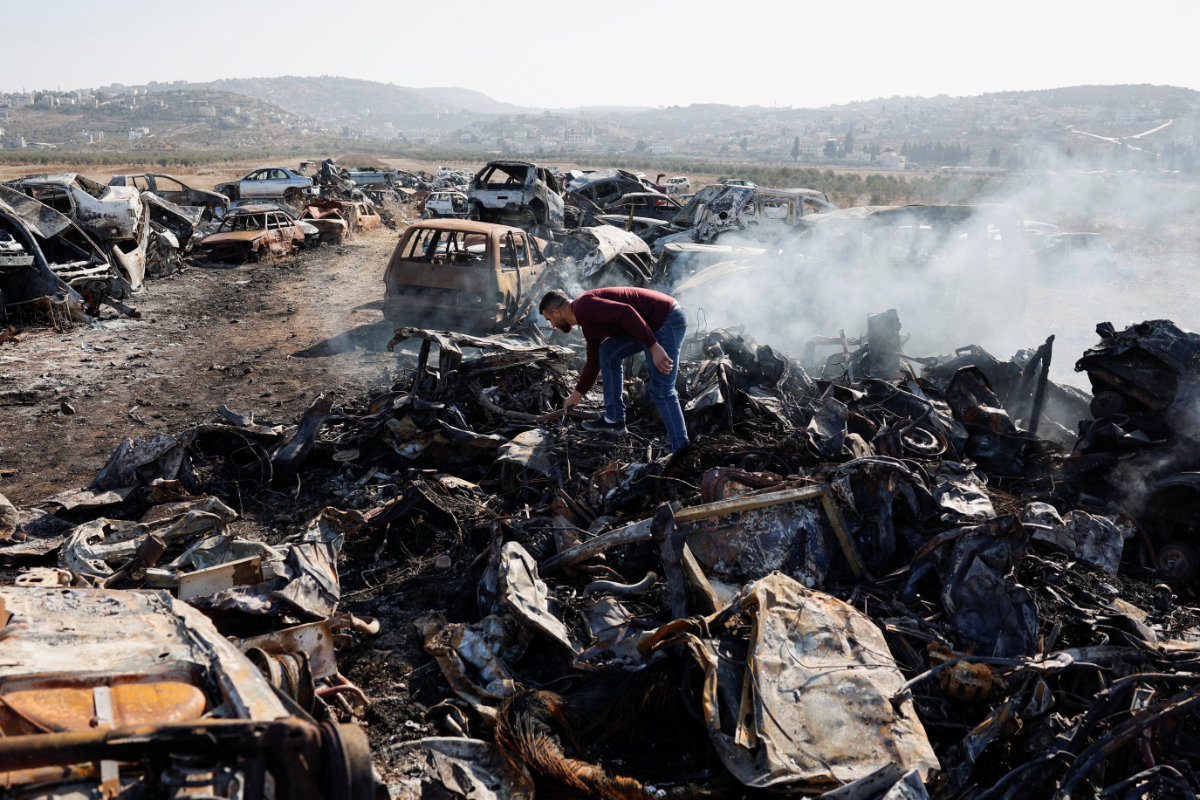
The UN says large-scale operations in Jenin and Tubas governorates affected more than 95,000 Palestinians between Nov. 25 and Dec. 1.
All of this has unfolded alongside accelerated settlement expansion and rising settler violence.
So far this year, OCHA has documented 1,680 settler attacks across more than 270 communities — an average of five per day — with the olive harvest season marked by widespread assaults on farmers, trees, and agricultural infrastructure.
In a landmark decision in July 2024, the International Court of Justice ruled that Israel’s occupation of the Palestinian territories is unlawful.
The Court also ruled that Israel must “immediately and completely cease all new settlement activities, evacuate all settlers, stop the forcible transfer of the Palestinian population, and prevent and punish attacks by its security forces and settlers.”
UN experts in 2025 referred to this advisory opinion to criticize ongoing settlement expansions and military operations as violations of international law.
